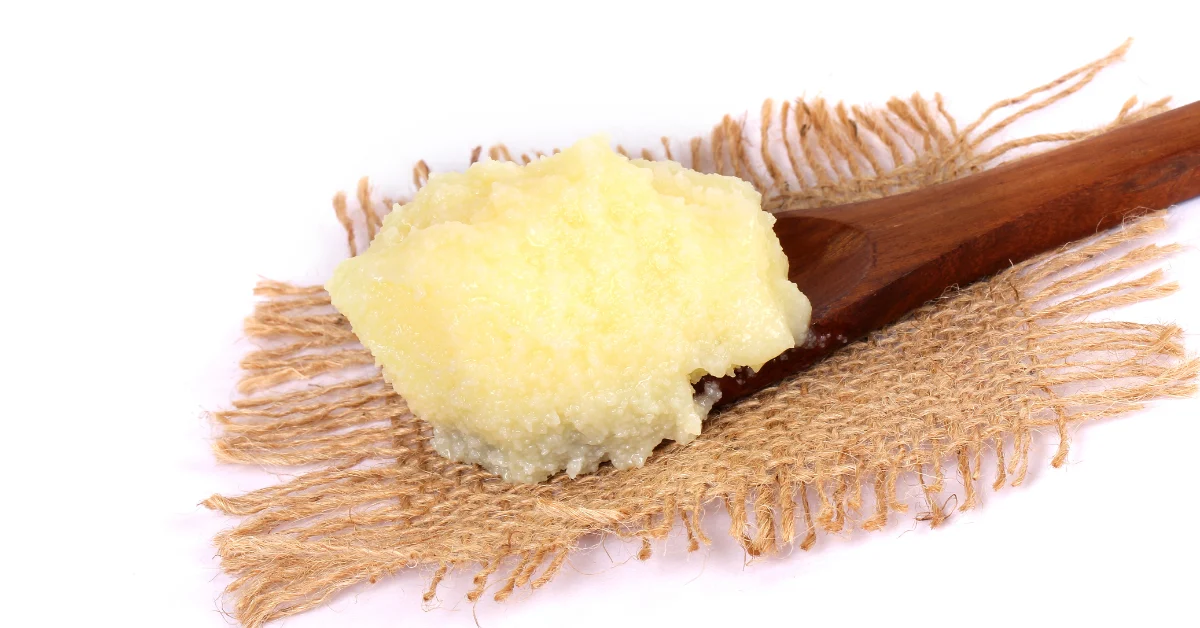Ayurvedic traditions frequently extol desi ghee, a century-old Indian cooking staple, as a superfood. Made from cow’s milk butter, it is a popular element in many different cuisines because of its flavor and plenty of minerals.
However, there has been much discussion concerning the pros and cons of desi ghee for heart health. People are now more careful about what they eat, especially when it comes to lipids, as heart disease rates have increased worldwide.
We will explore the topic of whether desi ghee is heart-healthy in-depth at Cowgenic. We will discuss the possible advantages and disadvantages of Desi ghee as well as its nutritional makeup and provide a well-rounded guide for adding it into a heart-healthy diet.
Nutritional Composition of Desi Ghee
To understand whether desi ghee is good for heart health, it’s essential to first look at its nutritional profile.
Here’s a breakdown of the primary components of desi ghee:
- Fats: With over 99.9% fat content, desi ghee is mostly made of fat. It is composed of around 62% saturated fat, 29% monounsaturated fat, and 4% polyunsaturated fat. Regarding heart health, saturated fats have generated debate, yet not all saturated fats are created equal.
- Vitamins: The fat-soluble vitamins A, D, E, and K are all found in good amounts in ghee. These vitamins are known to enhance heart health by avoiding plaque accumulation, lowering oxidative stress, and maintaining appropriate blood vessel function. They are essential for overall health.
- Conjugated Linoleic Acid (CLA): Ghee contains CLA, a type of polyunsaturated fat found in meat and dairy products. Some studies suggest that CLA may help reduce body fat and improve heart health by lowering the risk of plaque formation in arteries.
- Butyrate: This ghee’s short-chain fatty acid contains anti-inflammatory qualities and could enhance the health of the digestive system. Many chronic diseases, including heart disease, are associated with inflammation; therefore, lowering inflammation may be beneficial to heart health.
The Saturated Fat Debate: How Does It Affect Heart Health?
There has been heated discussion over the long-term effects of saturated fats on heart disease. Previous studies have revealed that saturated fats increase the levels of LDL (low-density lipoprotein) cholesterol, which causes plaque to accumulate in the arteries and raises the risk of strokes and heart attacks.
The result was the recommendation to consume fewer saturated fats in food guidelines.
Recent studies have, however, complicated this theory. Saturated fats can increase levels of low-density lipoprotein (LDL) cholesterol, but they can also enhance levels of high-density lipoprotein (HDL), or “good” cholesterol. Furthermore, the kind of LDL counts.
Large fluffy LDL particles, which are less dangerous than small dense LDL particles that are more prone to create blockages, are generally increased by ghee.
It’s also essential to remember that different types of saturated fats have different properties. Butyrate, one of the short- and medium-chain fatty acids found in ghee, may in fact have neutral or even positive benefits on heart health.
If ghee is taken in moderation, some studies think its negative effects would not be as great as those of processed foods or trans fats, which are other sources of saturated fat.
Benefits of Desi Ghee for Heart Health
While ghee is often associated with saturated fats, it also offers several potential benefits for heart health:

1: Rich in Omega-3 Fatty Acids
Ghee from grass-fed cows is particularly rich in omega-3 fatty acids, which are known for their anti-inflammatory properties. Omega-3s help reduce triglycerides, lower blood pressure, and decrease the risk of arrhythmias (irregular heartbeats). They are essential in promoting overall cardiovascular health.
2: High in Antioxidants
Desi ghee is packed with antioxidants, which help neutralize free radicals in the body. Free radicals are unstable molecules that can cause oxidative stress, leading to chronic inflammation and damage to the cardiovascular system. By reducing oxidative stress, antioxidants can help maintain healthy blood vessels and prevent heart disease.
3: Butyrate’s Role in Reducing Inflammation
The butyrate in desi ghee is a short-chain fatty acid with powerful anti-inflammatory properties. Chronic inflammation is a significant risk factor for heart disease as it can lead to the buildup of plaque in the arteries. By reducing inflammation, ghee may help support heart health.
4: Good for Cholesterol Balance
Moderate consumption of ghee may positively impact cholesterol levels. Ghee increases the levels of HDL (good cholesterol), which helps remove LDL (bad cholesterol) from the bloodstream. High HDL levels are associated with a reduced risk of heart disease.
Potential Risks of Desi Ghee for Heart Health
While there are benefits to consuming desi ghee, it’s crucial to be aware of potential risks, especially for individuals with pre-existing heart conditions or those at high risk.
1: High in Saturated Fats
Even though recent research has challenged the notion that all saturated fats are harmful, ghee is still high in saturated fats. Consuming large amounts of ghee regularly can increase total cholesterol levels, which may elevate the risk of heart disease in certain individuals, especially those genetically predisposed to high cholesterol.
2: Calorie-Dense
Ghee is calorie-dense, providing around 112 calories per tablespoon. Overconsumption can lead to weight gain, which is a risk factor for heart disease. It’s essential to be mindful of portion sizes when adding ghee to your diet, particularly if you’re trying to manage your weight.
3: Not Suitable for Everyone
Individuals with existing heart disease, obesity, or high cholesterol should consult their doctor or a nutritionist before incorporating ghee into their diet. Personalized dietary recommendations are crucial for those with health conditions.
How to Include Desi Ghee in a Heart-Healthy Diet: A Balanced Approach

If you’re looking to incorporate desi ghee into your diet while maintaining heart health, moderation is key.
Here’s how you can enjoy ghee without overloading on unhealthy fats:
- Portion Control: Stick to small servings of ghee. A teaspoon or two per day can provide the health benefits of ghee without overdoing the saturated fats. Try using ghee for sautéing vegetables or as a finishing touch on dal or rice.
- Choose Grass-Fed Ghee: Whenever possible, opt for ghee made from grass-fed cows. Grass-fed ghee has a higher concentration of beneficial omega-3 fatty acids and CLA, both of which contribute to better heart health.
- Balance with Other Healthy Fats: Incorporate a variety of fats into your diet, including monounsaturated and polyunsaturated fats from sources like olive oil, nuts, seeds, and fish. A mix of healthy fats can improve cholesterol levels and reduce inflammation, promoting overall heart health.
- Pair with a Balanced Diet: Desi ghee can be part of a balanced diet that includes plenty of fruits, vegetables, whole grains, and lean proteins. These foods provide fiber, antioxidants, and essential nutrients that support cardiovascular health.
- Monitor Cholesterol Levels: If you’re concerned about your heart health, it’s essential to monitor your cholesterol levels regularly, especially if you consume ghee. Regular check-ups with your healthcare provider can help you make informed decisions about your diet.
Ayurvedic Perspective on Desi Ghee for Heart Health
Ayurveda, the ancient system of medicine from India, holds ghee in high regard as a medicinal and culinary fat. According to Ayurvedic texts, ghee helps strengthen the heart, improve digestion, and promote mental clarity.
It is believed to nourish all tissues of the body, including the heart, and is recommended in moderation for its sattvic (pure and balancing) qualities.
Ayurveda also suggests that the method of preparation, the source of the milk, and how ghee is consumed play a significant role in its health benefits.
Ghee is often paired with herbs like turmeric or garlic in Ayurvedic preparations to enhance its therapeutic effects, particularly for heart health and overall wellness.
Conclusion: Is Desi Ghee Good for the Heart?
The answer to whether desi ghee is good for the heart lies in the balance. While ghee offers several heart-healthy benefits, such as being rich in omega-3s, antioxidants, and anti-inflammatory properties, it is also high in saturated fats.
When consumed in moderation and as part of a balanced diet, desi ghee can be a nourishing addition to a heart-healthy lifestyle.
For the majority of individuals, the secret is to utilize ghee carefully and in moderation, balancing it with other healthful fats and nutrient-dense foods instead of completely cutting it entirely. Before making big dietary changes, it’s best to speak with your healthcare professional if you have a history of cardiac problems or are considered high-risk.
Desi ghee is a tasty and healthful addition to any modern diet when used in moderation and in a balanced manner.
FAQs (Frequently Asked Questions)
Is desi ghee safe for heart health?
Yes, in moderation, desi ghee can be safe for heart health. It contains healthy fats like omega-3 fatty acids, which may help improve cholesterol levels. However, excessive consumption can increase saturated fat intake, potentially raising the risk of heart disease.
Does desi ghee increase cholesterol?
Desi ghee contains saturated fats, which can raise cholesterol levels if consumed in large amounts. However, it also contains good fats that may help improve the balance between good (HDL) and bad (LDL) cholesterol when consumed in moderation.
Can desi ghee help reduce inflammation related to heart disease?
Yes, desi ghee has anti-inflammatory properties due to its content of conjugated linoleic acid (CLA) and butyrate. These compounds may help reduce inflammation, which is a key factor in heart disease.
How much desi ghee is safe to consume for heart health?
For heart health, it’s best to limit desi ghee consumption to 1-2 teaspoons per day as part of a balanced diet. It’s important to consult a healthcare provider to determine the right amount based on your health condition.
Is desi ghee better for the heart than refined oils?
Desi ghee is considered a healthier option compared to many refined oils due to its natural fat content and absence of harmful trans fats. However, it’s essential to use both ghee and oils in moderation to maintain heart health.




